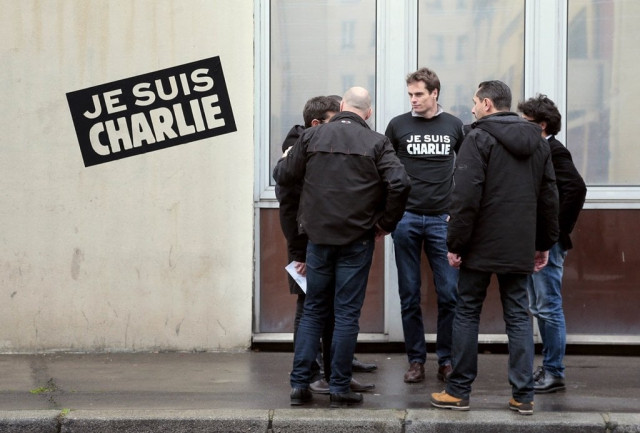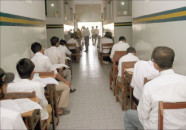The Paris attack and its aftermath
Along with this brutality, backlash against Muslim population of West in response makes perpetrators doubly guilty

Showing support for Charlie Hebdo does not mean that publications in Europe or America replicate the editorial judgements of the French magazine. PHOTO: AFP
No matter what the provocation, a significant section of Europeans seem to have justifiably gone into a reactive mode. And as a consequence, the political and social elements championing anti-Muslim and anti-immigration policies in Europe, especially in France, seem to have suddenly found a more urgent as well as a more cogent reason to justify their hate campaigns. The six million Muslims living in France understandably dread a backlash and fear that the sense of Islamophobia already very visible in their country would further deepen.
The National Front, the French political party that promotes Islamophobia and relentlessly raises the spectre of the so-called threat it holds for French society and its values is said to have already out-paced the French Socialist Party in popularity polls. And its leader Le Pen, who has been knocking for some years on the doors of his country’s mainstream politics from the margins, it is feared, is likely to use the bloody incident to further his hate campaign. There is little doubt that the French extreme right is expected to benefit immensely from these killings. And French Muslims are likely, as a consequence, to suffer more. This situation is not likely to remain confined to France alone.
The rest of the West, too, is likely to experience the aftershocks. In the UK, the ultra-right UK Independence Party is likely to use the event as a more persuasive argument in its campaign against London’s current immigration policy, a campaign which the mainstream political parties are already finding increasingly difficult to oppose. In Sweden, the Democratic Party that promotes anti-immigrant and anti-Muslim sentiments and which in recent polls has been getting 15 per cent support is also expected to cash on the Paris massacre. Indeed, those who would suffer the most from this event would be the majority of the West’s Muslim population, most of which is made up of law-abiding, ordinary people who believe in the policy of live and let live and who do not subscribe to the distorted version of their faith that is being propagated by a handful of misguided extremists.
The reason behind the daylight massacre is said to be the publication of highly provocative cartoons published in the recent past, which had deeply offended Muslims. What is frustrating is the fact that the weekly in question, highly popular in the 1960s, had become too obscure by the current Parisian standards and is said to have become a museum piece. What this reprehensible attack has done is to instigate other major Western publications to republish the same offensive cartoons that Charlie Hebdo had carried, ostensibly in a bid to show solidarity with the magazine. One wonders whether this is the right way to show solidarity and condemn these attacks. Showing support for Charlie Hebdo does not mean that publications in Europe or America replicate the editorial judgements of the French magazine. Before these attacks, even those who believed in artistic license and liberal use of freedom of expression are said to have started feeling sickened by the sick lampooning indulged in by this relic of the past, offending equally, Muslims, Jews and Christians and politicians of all colours and hues. Along with this unnecessary brutality, the likely backlash against the Muslim population of the West in response makes the perpetrators doubly guilty.
Published in The Express Tribune, January 11th, 2015.
Like Opinion & Editorial on Facebook, follow @ETOpEd on Twitter to receive all updates on all our daily pieces.



















COMMENTS
Comments are moderated and generally will be posted if they are on-topic and not abusive.
For more information, please see our Comments FAQ